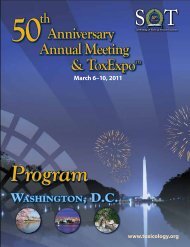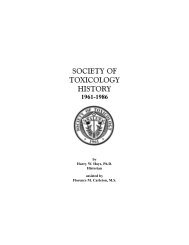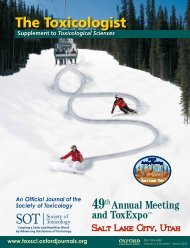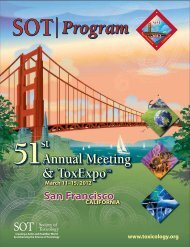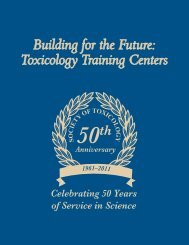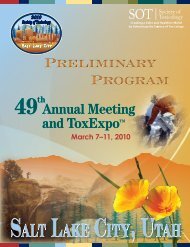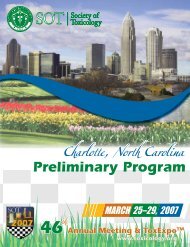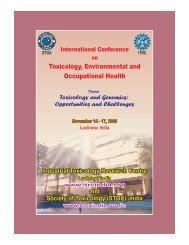51st Annual Meeting & ToxExpo - Society of Toxicology
51st Annual Meeting & ToxExpo - Society of Toxicology
51st Annual Meeting & ToxExpo - Society of Toxicology
You also want an ePaper? Increase the reach of your titles
YUMPU automatically turns print PDFs into web optimized ePapers that Google loves.
<strong>Society</strong> <strong>of</strong> <strong>Toxicology</strong> 2012<br />
Scientific<br />
Symposia<br />
• The Roche Experience with the EST Assay and Development <strong>of</strong> a<br />
Novel, Fully Automated Approach. Claudia McGinnis, H<strong>of</strong>fmann-<br />
La Roche, Basel, Switzerland.<br />
• Transcriptomics Approaches Towards Biomarkers <strong>of</strong><br />
Embryotoxicity in the Embryonic Stem Cell Test. Aldert Piersma,<br />
National Institute for Public Health and the Environment RIVM,<br />
Bilthoven, Netherlands.<br />
• Use <strong>of</strong> Zebrafish for Identification <strong>of</strong> Targets <strong>of</strong> Teratogenicity.<br />
Hiroshi Handa, Tokyo Institute <strong>of</strong> Technology, Yokohama, Japan.<br />
• Virtual Embryo: Systems Modeling <strong>of</strong> Developmental Toxcity.<br />
Thomas Knudsen, US EPA, Research Triangle Park, NC.<br />
• ES Cell-Based Novel Alternative Testing Strategies—The ESNATS<br />
Project. Juergen Hescheler, University <strong>of</strong> Cologne, Cologne,<br />
Germany.<br />
Wednesday<br />
Aberrant Gene Expression in Toxicity<br />
and Disease—Epigenetics and<br />
microRNAs<br />
Epigenetic and miRNA Regulations in<br />
Carcinogenesis: Toxicological Implications<br />
Wednesday, March 14, 9:00 AM to 11:45 AM<br />
Chairperson(s): Jessica R. Placido, Saint John’s University, Jamaica,<br />
NY, and Enrique Fuentes-Mattei, The University <strong>of</strong> Texas MD<br />
Anderson Cancer Center, Houston, TX.<br />
Sponsor:<br />
Graduate Student Leadership Committee<br />
Endorsed by:<br />
Carcinogenesis Specialty Section<br />
Hispanic Organization <strong>of</strong> Toxicologists Special Interest Group<br />
Mechanisms Specialty Section<br />
Molecular Biology Specialty Section<br />
Postdoctoral Assembly<br />
Epigenetics is an increasingly evolving scientific field focused<br />
on mechanisms involving heritable gene expression pr<strong>of</strong>iles and<br />
phenotypic changes fundamental for normal development without<br />
alterations in nucleotide sequence. DNA methylation and acetylation<br />
patterns, histone modifications, germ-line reprogramming<br />
and noncoding RNAs mediate epigenetic regulations. Increasing<br />
evidence suggests that disruption and alteration <strong>of</strong> normal epigenetic<br />
regulation mechanisms are fundamental in cancer development and<br />
progression. Recent evidence shows that exposure to air toxicants and<br />
environmental pollutants triggers changes in microRNA (miRNA)<br />
expression pr<strong>of</strong>iles. These cellular changes reveal novel mechanisms<br />
through which toxicants may induce adverse health effects,<br />
The Thematic Track information can be found on pages 8–9.<br />
including the development <strong>of</strong> leukemia and liver carcinogenesis. In<br />
addition, arsenic has been implicated in the development <strong>of</strong> human<br />
skin, lung, bladder, liver, and prostate cancers. Histone modifications<br />
have been suggested as epigenetic mechanisms related to<br />
arsenic-induced carcinogenesis. Identification and development <strong>of</strong><br />
new therapeutic strategies with specific and selective targets in the<br />
epigenetic machinery are <strong>of</strong> utmost importance. Recent research<br />
shows that detecting alterations in miRNA expression has been<br />
associated with early stages <strong>of</strong> tumor development. These findings<br />
suggest that miRNAs may play an important role in cancer risk<br />
assessment. Alternatively, histone deacetylase inhibitors are effective<br />
in the treatment <strong>of</strong> hematological malignancies such as leukemia in<br />
children. Epigenetic alterations that result in carcinogenesis stress the<br />
importance <strong>of</strong> research efforts to characterize associated molecular<br />
mechanisms and highlight current public health issues.<br />
• Epigenetic Effects <strong>of</strong> Formaldehyde Exposure. Julia Rager,<br />
University <strong>of</strong> North Carolina Chapel Hill, Chapel Hill, NC.<br />
• Arsenic-Induced Alterations in Global Posttranslational Histone<br />
Modifications among Adults in Bangladesh. Yana Chernova,<br />
New York University School <strong>of</strong> Medicine, New York, NY.<br />
• The Molecular and Epigenetic Mechanisms Involved in<br />
Mammalian LINE-1 Retroelement Silencing Are Altered by<br />
Benzo(a)Pyrene. Diego Elias Montoya-Durango, University <strong>of</strong><br />
Louisville, Louisville, KY.<br />
• Epigenetic and miRNA Dysregulation in Liver Nongenotoxic<br />
and Genotoxic Tumorigenesis. Kristy Kutanzi, National Center for<br />
Toxicological Research, Jefferson, AR.<br />
• Oxidative Stress-Based Strategies for Enhancing the Efficacy <strong>of</strong><br />
Histone Deacetylase Inhibitors (HDACi) for the Treatment <strong>of</strong><br />
Leukemias. Nilsa Rivera-Del Valle, The University <strong>of</strong> Texas MD<br />
Anderson Cancer Center, Houston, TX.<br />
Innovations <strong>of</strong> Applied <strong>Toxicology</strong> (IAT) Session<br />
Nonclinical Safety Assessment <strong>of</strong> Dual-Targeting<br />
Biotherapeutics<br />
Wednesday, March 14, 9:00 AM to 11:45 AM<br />
Chairperson(s): Matthew S. Bogdanffy, Boehringer Ingelheim<br />
Pharmaceuticals, Inc., Ridgefield, CT, and Anne Pilaro, US FDA,<br />
Silver Spring, MD.<br />
Sponsor:<br />
Biotechnology Specialty Section<br />
Endorsed by:<br />
Drug Discovery <strong>Toxicology</strong> Specialty Section<br />
Immunotoxicology Specialty Section<br />
Regulatory and Safety Evaluation Specialty Section<br />
Engineering <strong>of</strong> protein-based biotherapeutics has advanced<br />
significantly in recent years to delivering novel molecules having<br />
Thematic Session<br />
78<br />
SOT’s 51 st <strong>Annual</strong> <strong>Meeting</strong>



